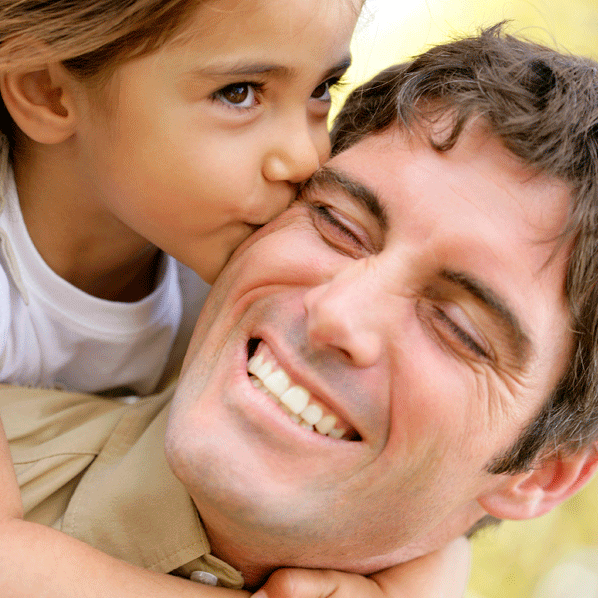We thought we wanted a baby. A tiny fist wrapped around our fingers. The smell of talcum powder. A coo, a cry, a cuddle.
But after trying, unsuccessfully, to conceive — including an attempt at in vitro fertilization — my husband, Kevin, and I decided to explore adoption.
Overwhelmed by the prospects of international adoption and the costs and risks of independent domestic adoption, Kevin and I decided to sign up to be foster parents. We could help a child, we reasoned, while trying to decide the best way to get one of our own. We imagined a toddler, delivered to our door, longing to be loved and nurtured.
That's not what happened.
Special Needs
In Louisiana (where we lived), couples who want to become certified foster or adoptive parents first take a nine-week course, to learn about parenting and about the children who need homes.
The faces of waiting children look much the same in every state. They are six and 10 and 12. They are children with difficult histories. They are not infants or toddlers. They are not blank slates. Some have emotional problems and learning disabilities and even serious health concerns. But like all children, they need permanent families. A place to call home, a place of safety and guidance today, a place to bring the grandkids for Christmas tomorrow.
Kevin and I looked through photos of Louisiana's waiting children. The faces haunted us. They were smiling for the camera, like puppies in a pet store window wagging for a home. We were overwhelmed with sorrow and regret. Regret that we couldn't adopt them all. The question of whether to adopt one of the children in these photos was became how do we adopt one?
A social worker helped narrow our search. Would we consider a sibling group? We had two extra bedrooms, Kevin pointed out. With bunk beds, we could easily take three.
Special needs? Here we hesitated. Older children in the foster care system would likely have emotional problems, we reasoned. Could we handle learning disabilities, as well? Medical conditions?
We decided that we could handle "moderate" disabilities, but that, as first-time parents, we did not have the skills or confidence to handle severe problems.
And so we continued with our classes and waited for a call. It didn't take long for our children to find us. A friend was the temporary foster mother of a sister and brother, eight and 10, who were on their sixth foster placement. They were not yet available for adoption, but were expected to be shortly. We saw their pictures, talked to their foster mother, and arranged for a visit. Three weeks later, our family grew by two.
Special Firsts
Those first few days were a bit uncomfortable for us all. Kevin and I tried to help the children settle in. They were polite houseguests, busy with a new school and picking out new clothes and toys. The process of becoming a true family unfolded in the months to come.
Couples who consider adopting older children often worry that they will mourn having missed the firsts: first step, first word...first grade.
But parents of older adopted children have their own set of firsts. The first time my son, Derek, stopped calling me "Miss Kate" and called me Mom. And how he liked the sound of it, and for the next few days liberally sprinkled every sentence with it.
"Mom, what's for dinner, Mom? Mom, can I go outside to play, Mom?"
Or the first time my daughter, Arielle, blurted out "I love you" as she ran off to catch the school bus.
Or the first time my son felt safe enough to whisper in my ear a painful secret — a hurt he'd never told anyone — trusting that I would help him heal.
Or the first time someone passed my desk at work, noticed the photographs of the children, and asked, "Are those your kids?" And I said, "Yes, yes they are."
Special Challenges
Our children, like many older adopted children, face challenges resulting from the losses they experienced moving from the home of their birth parents to homes of various relatives, to foster homes, and finally to our home. Their home.
We have had some behavior problems, anger outbursts, and nightmares. But we have also had plenty of laughter, love, and a growing trust.
One challenge faced by families who adopt older children is the birth family. In our case, a teenaged brother and maternal grandparents the children adore — and an aunt and uncle who are temporarily holding up our adoption as they wage a legal battle over custody — an honor they abused and lost long ago.
Each day we journey further into uncharted waters, as we find ways to bring some members of the birth family into the fold of our family while acting as sentry against those who can only do damage.
Special Support
The children's health needs are completely covered by the state, as is counseling. And we receive a monthly check to help cover the costs of room and board — a far cry from covering all the costs of Game Boys and karate lessons, but a help nonetheless. Once our adoption is final, state financial support will decrease, but not disappear. In Louisiana, full medical coverage continues, as does room and board payment, though at a reduced rate.
Derek and Arielle now have a home. As I hold my children's small hands in mine and breathe in their smell of strawberry shampoo and Sweet Tarts, I know I have the babies I was meant to have. And so, as the adoption moves forward, we wait for a judge to say what we already know: We are a family.
JOIN You are viewing this exclusive AF content as a guest. To access our full Adoption Parenting Library — plus digital issues, eBooks, expert audio and more — join Adoptive Families today.  |



